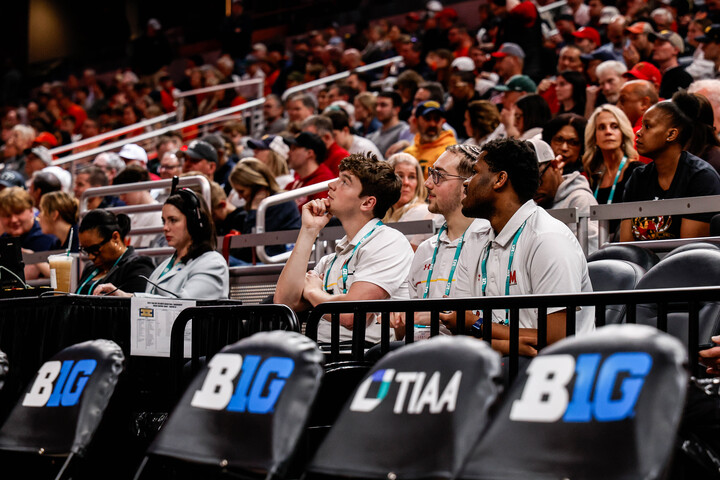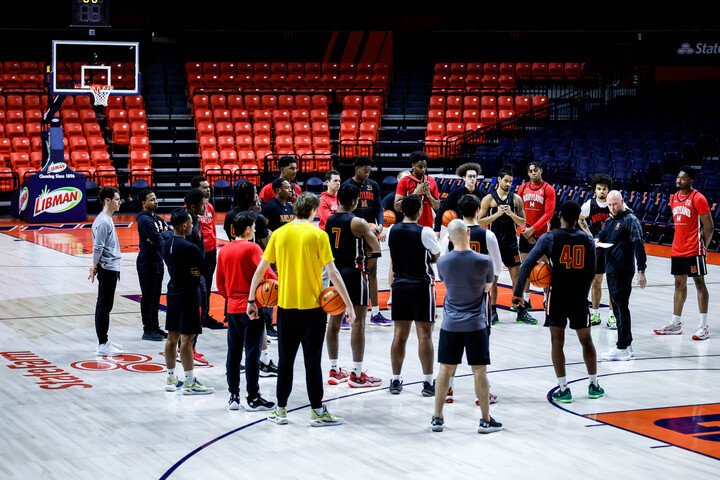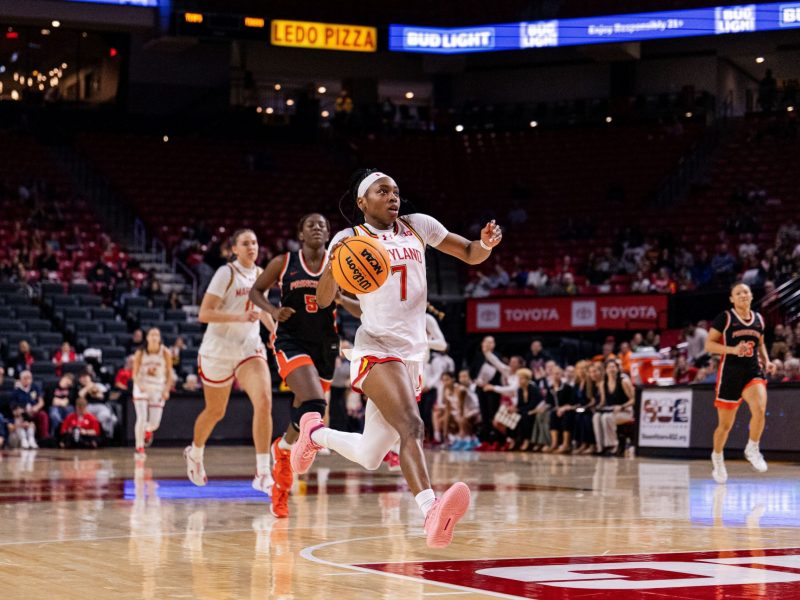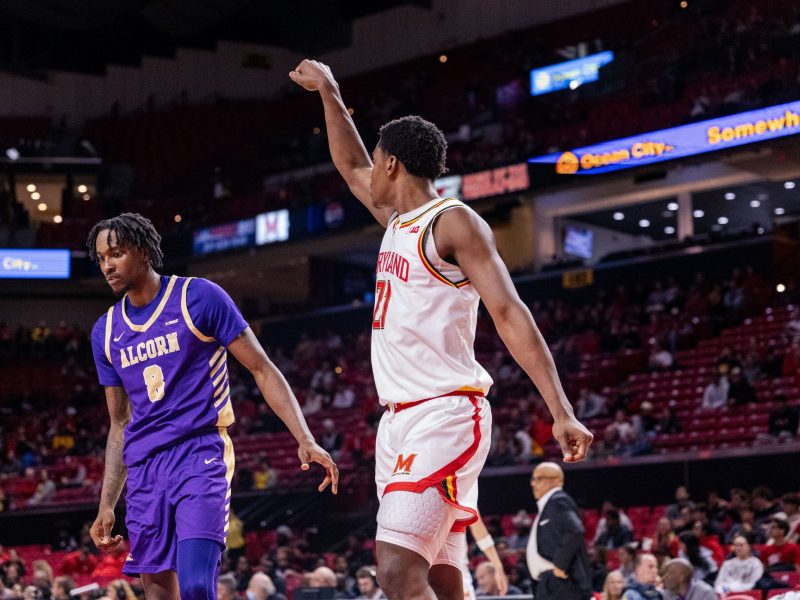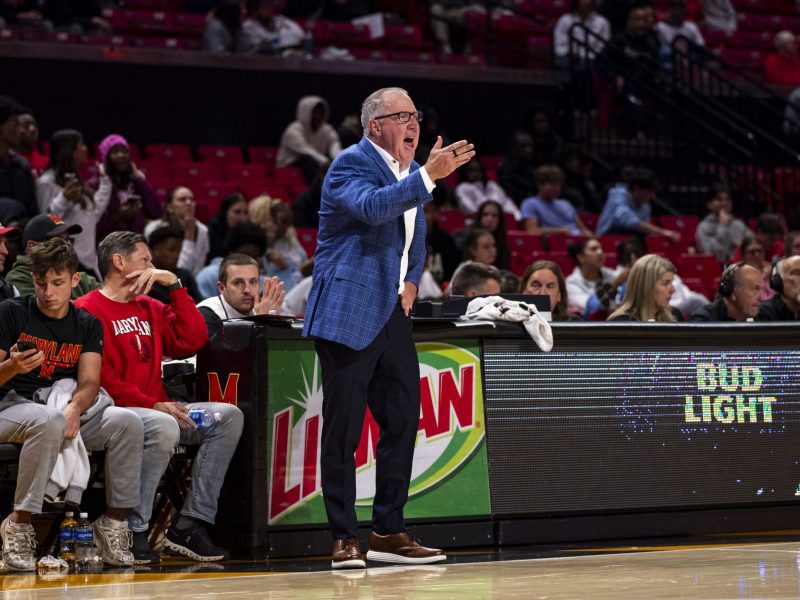The alarm sounded at 3:30 a.m. Minutes later, Jackson Greenbaum made his way to the Xfinity Center loading dock — the building silhouetted in darkness.
By 4:15, the junior management major had a golf cart loaded with training equipment. Greenbaum was en route to Ritchie Coliseum, a student recreation and wellness facility home to an underground weight room and — most importantly — one regulation basketball court.
The 1,500-seat gym served as Maryland men’s basketball’s home arena from 1931 to 1955. This particular morning was the return of Maryland’s revamped roster, joined by first-year coach Buzz Williams.
Greenbaum, the Terps’ head team manager, prepped the hardwood prior to three 45-minute group conditioning sessions — the first of which was slated to begin at 5:15 a.m.
The early-September morning encapsulates the life of a team manager. For the majority of the summer, 40-hour work weeks were common for Greenbaum.
It’s a grind. But he loves it.
“This is my family away from family,” Greenbaum said. “I’ve seen the staff and players more than I’ve seen my family in the last three years.”
Maryland has a 16-man roster this season, 15 of which are newcomers. Furthermore, six of the Terps’ senior team managers graduated this spring.
Walk-on guard Lukas Sotell, the team’s sole returning player in 2025-26, and a young manager core led by Greenbaum are the final tether to Maryland’s old regime.
“It’s been a great opportunity to lead while also learning myself,” Greenbaum said. “I’ve really been in charge, leading a lot of the transition stuff between last year to now.”
[Maryland basketball moves into long-awaited ‘first-class’ practice facility]
The nine Terp student managers are responsible for a lot, ranging from locker room, cooler and bench setup to late-night rebounding sessions and in-game stat coding.
But their primary role is to energize.
“[They] would hype us up as players,” said Ben Murphy, a Maryland guard from 2023-25. “Just seeing the energy they bring, we were like, ‘Oh, we can’t let the managers have more energy than the players.’”
Oftentimes, during daily practices last season, the team managers took the role of vocal leaders — specifically motivating Maryland’s post players in the ‘Hibbert’ drill, a vertical layup exercise, Murphy said.
They helped boost the Terps to 27 wins and a Sweet Sixteen appearance last season. Derik Queen and Julian Reese, Maryland’s starting frontcourt duo, converted more than 81 and 72 percent of their shots at the rim, respectively.
Greenbaum grew up working as a team attendant for the Minnesota Timberwolves, yet being a team manager in college wasn’t in his initial plans. After learning about the role from Jake Layman, a then-Timberwolves player and Maryland alum, Greenbaum’s interest was piqued.
Building toward a career in professional basketball, it seemed like a great opportunity to learn the inner workings of a Big Ten program while expanding his network, he said.
On home game days in College Park, Greenbaum’s Xfinity Center report time was often more than seven hours prior to tipoff.
The pregame duties fluctuate, with every manager assuming different positions. Some spent the day rebounding thousands of shots, others transported ball racks. During downtime, Greenbaum did homework.
[Maryland men’s basketball adds 4-star forward Adama Tambedou to 2026 recruiting class]
Now entering his third season with the team in an elevated leadership role, responsibilities increase. Days on the road start early for Greenbaum and the three other managers traveling with the team.
The day before an away game, the four-person crew conducts an unofficial hotel scout — scoping out the building for an adequate ballroom or meeting room. Later that night comes the room checks, when managers knock on doors to make sure all players are accounted for.
Then, early the next morning, Greenbaum leads a tedious process.
Just hours away from tip-off, Greenbaum pulls up an outline of collegiate court dimensions on his phone. The road managers sculpt a makeshift basketball court with temporary paper floor tape. Working under a mental shot clock, the baseline, three-point, key and lane lines are rapidly assembled before players — in pajamas and slides — and coaches arrive for a walkthrough of plays.
Finally, during Maryland’s game hours later, one manager is tasked with leaving the road arena early to pickup a postgame meal that’s ready for players immediately after the contest.
“Coming from a junior college where we had no managers and then coming into [Maryland’s] environment … is completely different,” Murphy said, who was previously at Howard Community College in 2022-23. “They’re definitely an important part of the team.”
Beyond the team-issued gear and travel benefits team managers receive, the position provides a wealth of value, Greenbaum said. The camaraderie with Maryland’s players, coaching staff and fellow managers is what keeps him coming back each day.
“It’s the little things that go into the day-by-day efforts that lead to those big wins [to mean] so much more,” Greenbaum said.
